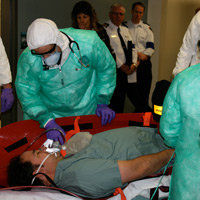Trent and First Responders Complete Successful IPCL3 Emergency Simulation
Training exercise an excellent opportunity to practice cooperation in community partnerships
 The training exercise that took place in the Indigenous Pathogen Containment Level 3 (IPCL3) Lab on Thursday, December 9, at Trent University’s DNA Building was a tremendous success.
The training exercise that took place in the Indigenous Pathogen Containment Level 3 (IPCL3) Lab on Thursday, December 9, at Trent University’s DNA Building was a tremendous success.
An emergency medical scenario was simulated and Trent University participated in the exercise along with community partners including the Ontario Ministry of Natural Resources (OMNR), the City of Peterborough Emergency Management Office (EMO), Peterborough Regional Health Care Centre (PRHC), Peterborough County Emergency Medical Services (EMS), Peterborough Fire Services, Peterborough Lakefield Community Police Services and the student-led Trent University Emergency First Response Team (TUEFRT).
“Everybody worked well together,” said Sandy Welsh, Superintendent of Emergency Management for the Peterborough County EMO. “There was excellent cooperation between police and fire department personnel at the scene and with the way they handled the patient.”
The newly constructed IPCL3 Lab provided an excellent opportunity to practice procedures and to engage in relationship building with community partners in a unique emergency response scenario. The training scenario centred on an employee who became ill within the lab and required medical attention.
Students with TUEFRT had an opportunity to participate in the exercise and witness the proceedings. “Originally the scenario presented that the patient was exposed to rabies but then it was upgraded to the Hanta virus,” said psychology student Ethan Brunton who was the first on the scene in the exercise.
“Important lessons were learned, which is why we have these exercises,” said Elisa Feltmate, the training coordinator for the team who is currently in her fourth year studying English at Trent. “From here we will continue to work with EMS and other agencies to determine best protocols in unique emergency situations like this for our training manual,” she added.
Trent University’s IPCL3 Lab is certified by the Canadian Food Inspection Agency (CFIA) and the Public Health Agency of Canada (PHAC) to work with approved indigenous pathogens in a safely contained environment for the purpose of researching emerging infectious diseases among various wildlife species. Trent’s new IPC Level 3 lab will be fully operational in 2011.
